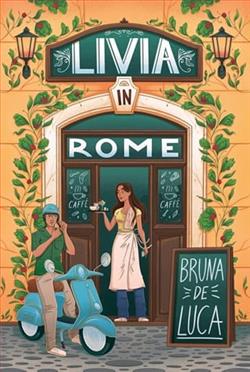Martial Peak Reviews
Bruna De Luca's Livia in Rome is a delightful exploration of identity, belonging, and the complexities of teenage emotions, all set against the vibrant backdrop of Rome. This novel, which is a sun-drenched clean teen romance, offers readers a refreshing take on the coming-of-age genre, blending cultural nuances with the universal themes of self-discovery and love.
The protagonist, Livia, is a sixteen-year-old Scottish Italian who finds herself spending the summer in her grandmother’s bar in Rome. From the outset, Livia feels like an outsider, a sentiment that many readers, especially those with multicultural backgrounds, will find relatable. De Luca skillfully captures the essence of being a third culture kid, drawing from her own experiences as a 'Scotalian'. This authenticity is palpable throughout the narrative, making Livia's journey both personal and universal.
One of the novel's strengths lies in its character development. Livia is portrayed as a complex character, grappling with her dual identity and the expectations that come with it. Her initial resistance to Rome and its people, particularly Giulio, the smug local boy who works at her grandmother’s bar, is both humorous and endearing. Giulio, on the other hand, is more than just a typical love interest. His character is layered, revealing vulnerabilities and strengths that make him a compelling counterpart to Livia.
The dynamic between Livia and Giulio is central to the novel's charm. Their relationship begins with tension and rivalry, reminiscent of classic romantic tropes, yet it evolves into something deeper and more meaningful. De Luca avoids the cliché of an instant summer romance, instead allowing their relationship to develop organically. This slow burn is both realistic and satisfying, providing readers with a genuine portrayal of teenage romance.
Beyond the romance, Livia in Rome delves into themes of family and friendship. Livia's interactions with her grandmother and the local community offer insights into Italian culture and the warmth of familial bonds. The family drama that unfolds is handled with sensitivity, adding depth to the narrative and highlighting the importance of understanding and communication within families.
Friendship is another key theme, as Livia navigates new-found relationships in Rome. These friendships are portrayed with authenticity, capturing the awkwardness and excitement of meeting new people and forming connections. De Luca's portrayal of teenage friendships is both realistic and heartwarming, adding another layer to Livia's journey of self-discovery.
The setting of Rome is almost a character in itself. De Luca's vivid descriptions bring the city to life, from the bustling streets to the serene beauty of its historical landmarks. The sensory details immerse readers in the sights, sounds, and flavors of Rome, making it an integral part of Livia's transformation. The city serves as a metaphor for Livia's journey, with its rich history and vibrant present mirroring her own exploration of identity and belonging.
Comparatively, Livia in Rome shares thematic similarities with novels like Love and Gelato by Jenna Evans Welch and Anna and the French Kiss by Stephanie Perkins. However, De Luca's novel stands out for its cultural authenticity and the depth of its character development. While Welch and Perkins offer delightful romantic escapades in picturesque settings, De Luca provides a more nuanced exploration of identity and cultural heritage, making Livia in Rome a unique addition to the genre.
In conclusion, Livia in Rome is a captivating read that will resonate with anyone who has ever felt like an outsider or grappled with questions of identity. Bruna De Luca's debut novel is a testament to the power of storytelling, offering a fresh perspective on the coming-of-age narrative. With its engaging characters, rich setting, and thoughtful exploration of themes, Livia in Rome is a must-read for fans of teen romance and those seeking a deeper understanding of cultural identity.
Ultimately, De Luca's novel is a celebration of self-discovery, love, and the beauty of embracing one's heritage. It is a story that will linger in the hearts of readers long after the final page is turned, leaving them with a renewed appreciation for the complexities of identity and the transformative power of love.








![Subscribed to GodTube [Official]](/upload/pic/manga/subscribed-to-godtube--official-.jpg)















Reviews 0
Post a Reviews: